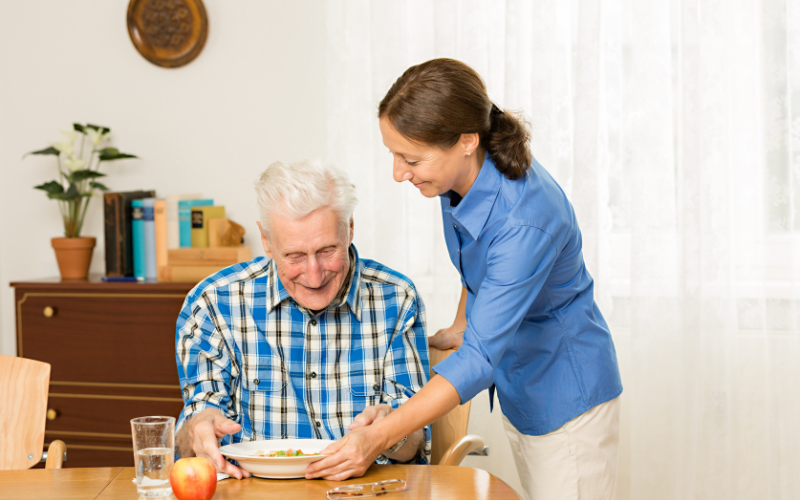
Body weight is linked to overall physical health, so maintaining an optimal weight is a goal all seniors should strive for. But age-related factors can contribute to difficulty in keeping weight stable. Here are weight-management tips for aging adults and the caregivers who support them.
Weight is susceptible to changes due to the aging process. On one hand, older people may gain weight because their metabolism changes. As the metabolism slows, aging adults must become more active or reduce their calorie intake to maintain an ideal weight.
On the other hand, seniors can lose weight unintentionally. A number of age-related causes contribute to their weight loss. Aging people are likely to lose their appetite, feel pain when chewing or swallowing or are mobility challenged, and have trouble leaving the house to buy groceries.
How does weight impact health?
Weight loss that is sudden and unexpected can be an indicator of disease. Cancer, gastrointestinal disorders, and neurological issues can be the cause of sudden, unintended weight loss. Losing weight rapidly should prompt seniors to undergo a medical checkup to determine the cause.
Maintaining a healthy weight is important to deter the increased risk of developing health problems. An elevated body mass index (BMI) is associated with medical conditions, such as diabetes, heart disease, high blood pressure, and stroke. Losing weight decreases these risks.
Seniors are not advised to lose too much weight either, as medical problems can likewise develop. A low body mass index can contribute to the development of osteoporosis and anemia. If aging people develop infections or illnesses, a low body weight can make recovery more difficult.
How do seniors succeed in weight management?
Keeping weight within a normal range involves a combination of exercise and good nutrition. Active seniors who consume a healthy diet also feel more energetic and decrease their risk for developing health-related issues. Losing weight or gaining weight is partly influenced by calories.
In general, losing weight requires that aging adults reduce their daily calorie intake or increase their amount of physical activity. Conversely, older people who intend to gain weight are advised to eat more calories yet maintain a moderate level of physical activity.
How do seniors lose weight?
Tip 1: Reduce portion sizes
Specific tactics seniors can use to lose weight include limiting portion sizes. Eating smaller meals helps overweight seniors reduce their calorie intake. Seniors should fill up with water, which also keeps them hydrated. Caregivers who prepare meals should opt for healthy foods and drinks without sugar.
Tip 2: Exercise
Incorporate physical activity into each day. Seniors should aim for 150 minutes of exercise per week to stay fit and burn calories. Recommended moderate-intensity activities include brisk walking. Or engage in 75 minutes per week of vigorous-intensity exercises, like jogging or hiking.
Tip 3: Stay motivated
Seniors who keep track of what they eat in a food diary are more aware of their daily calorie intake over time. If a break in daily progress occurs, older people are urged to get back on track right away. Stay motivated by setting realistic nutrition and exercise goals.
How do seniors gain weight?
Tip 4: Eat healthy high-fat foods
When seniors aim to gain weight, it is not a license to splurge on unhealthy foods. Rather, these older adults are encouraged to consume more foods, like avocados and peanut butter, that contain healthy fats. Eat nutrient-rich snacks, such as nuts and cheese, to help promote weight gain.
Tip 5: Make meals fun
Dining with friends, family, or caregivers makes mealtime an enjoyable experience. Social engagement during lunch or dinner is a pleasant experience for older adults who lack a robust appetite. As a result of the positive feelings, aging people are more likely to consume more food during the meal.
Tip 6: Stay active
While exercising is a key lifestyle choice to lose weight, it is also an important factor for seniors trying to gain weight. Participate in regular physical activity to boost appetite. Exercise should be strenuous enough that seniors break a sweat and increase their heart rate.
Seniors should try to choose enjoyable physical activities that encourage them to remain consistent. Gardening, dancing, walking, and swimming are preferred by many older adults. Aging people also feel more confident when a caregiver is by their side, supporting them as they walk.
Managing a healthy weight requires eating the right number of calories and staying physically active. In general, women over 60 should consume between 1,600 to 2,200 calories per day to maintain their weight and stay healthy. Moderately active men over 60 require 2,200 calories daily.
Shopping for healthy foods, preparing nutritious meals, and scheduling exercise into each day can seem overwhelming. But the experienced caregivers from Assisting Hands Home Care understand the daily needs of older adults and are instrumental in helping them reach their weight goals.

Our home care services provide exceptional non-medical care to seniors in the comfort of home. Professional caregivers are tasked with a range of responsibilities that keep older adults safe, comfortable, and healthy. We also serve as excellent companions to enhance their social well-being.
Grocery shopping, meal preparation, and assistance with eating are examples of the senior care services we offer. We also provide transportation to the doctor’s office and senior exercise classes. Caregivers give reliable medication reminders, perform light housekeeping, and offer transfer assistance.
Specialized care services are also available. Our caregivers support Alzheimer’s and dementia patients with compassionate memory care. If your elderly loved one returns home from surgery, our post-surgical care is helpful. We also provide respite care, live-in care, and overnight care, among many other care options.
Elder care from Assisting Hands Home care is essential for keeping your aging loved one in peak physical, emotional, and social health. For all-around care, turn to our home care agency. We serve senior in Glen Ellyn, IL | Warrenville, IL | Naperville, IL | Westmont, IL | Woodridge, IL | Lisle, IL | Plainfield, IL | Wheaton, IL, and the surrounding areas. Call us at (630) 634-9316 today to schedule a complimentary in-home consult and begin quality senior home care.
Sources:
https://www.nia.nih.gov/health/maintaining-healthy-weight
https://assistinghands.com/blog/social-meal-times-for-senior-care-in-houston/
https://www.livestrong.com/article/415222-guidelines-for-mens-daily-calorie-intake/
https://www.healthline.com/nutrition/calories-for-a-healthy-65-year-old-woman#2















